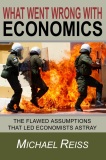A week ago I wrote a letter to the Financial Times. My motivation was partly to publicise both my full reserve banking website and my book. When I heard nothing back I assumed that they had chosen not to use it. But then just now I discovered that it appeared in the paper yesterday and I never even saw it! To add insult to injury, they my put my name down as "Michael Reiss" without any explanation of my credentials. I was hoping for "Michael Reiss, author of what Went Wrong with Economics."
EDIT: As not everyone has access to the FT website, here's the letter:
Sir, The phrase “credit crunch” has been widely used to describe the freeze in lending that can occur at the tipping point of economic bubbles (for example “Spanish banks turn off the credit taps”, August 12). This is, however, misleading because it perpetuates the myth that “credit” is somehow fundamentally different from money.
Using this phrase allows the public to carry on believing the false notion that there is an essentially fixed pool of money out there and the only problem is the banks’ willingness to lend it out.
The truth is, credit is money. Due to the magic of fractional reserve banking, virtually every pound we spend is money that has been lent into existence. This is true even if we have no borrowings ourselves. During a so-called credit crunch, there is an aggregate preference for paying back loans over taking out new ones. This shrinks the amount of money in the economy. The opposite of lending money into existence occurs, that is to say paying back money out of existence. The fraction of people, or even politicians, that are aware of this fact, is frighteningly small.
A shrinking money supply has a host of unpleasant side effects, as anyone who lived through the Great Depression would testify. During the period 1929-1933 the money supply fell by a third.
Friday, 19 August 2011
Wednesday, 13 July 2011
"What Went Wrong with Economics" - published
 At last! My book is finally published! It should appear on amazon.com in about a week or so, but in the mean time, you can get your copy -> HERE.
At last! My book is finally published! It should appear on amazon.com in about a week or so, but in the mean time, you can get your copy -> HERE.
Saturday, 9 July 2011
I'm going to start following Richard Koo
I have just watched the (rather long!) video below and read this article about Chinese savings, both of which lead me to believe that Richard Koo is smarter than the average economist. Having said that, I don't agree that government borrowing is the only way out of the crisis - debt cancellation would still be better.
Friday, 1 July 2011
Now I'm getting scared...
The idea that Gordon Brown rescued the world from an economic crisis three years ago and that now we're in a period of "recovery" is a fantasy of the highest order. Almost none of the problems revealed in 2007/8 have been fixed. In my opinion there are bigger economic disasters ahead of use. Just take a look at this recent interview with Alan Greenspan where he talks very seriously about a US default in the near future. He says that it all depends on Greece!
One may ask how on earth the tiny economy of Greece could have any impact on the mighty US economy. The answer is that the world economy, with its ridiculous levels of borrowing, is like an ever taller tower in a game of Jenga. The taller the tower the less it takes to make it topple. If there is a mighty crash when Greece defaults, it won't really be the fault of Greece, it will be the fault of governments around the world allowing the tower to get too tall. Debts that could not be repaid should have been defaulted on years ago - allowing the debts to carry on rising will be seen in years to come as a disaster.
One may ask how on earth the tiny economy of Greece could have any impact on the mighty US economy. The answer is that the world economy, with its ridiculous levels of borrowing, is like an ever taller tower in a game of Jenga. The taller the tower the less it takes to make it topple. If there is a mighty crash when Greece defaults, it won't really be the fault of Greece, it will be the fault of governments around the world allowing the tower to get too tall. Debts that could not be repaid should have been defaulted on years ago - allowing the debts to carry on rising will be seen in years to come as a disaster.
Friday, 10 June 2011
What Went Wrong with Economics?
This is just a quick update on my book. Currently it is at the proof readers, I expect it back any day now. I've also decided on a title, its going to be called "What Went Wrong with Economics".
Tuesday, 24 May 2011
Austerity measures in the UK... scarcely begun.
For all the talk of cutting the deficit, it appears that we haven't even begun.
Sunday, 22 May 2011
FullReserveBanking.com
I found that this domain was not being used, so I thought I'd snap it up and turn it into a resource for anyone researching the field. If you know of any websites or articles I'm missing please tell me about it.
Subscribe to:
Posts (Atom)



